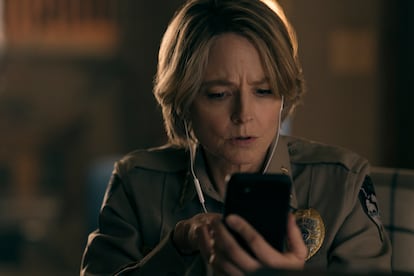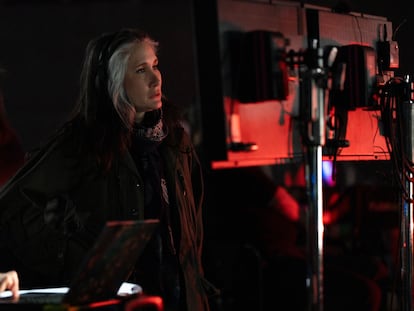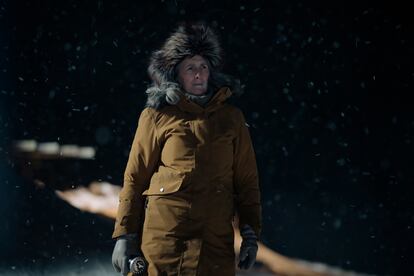A new case with Jodie Foster at the end of the world: Mexican Issa López takes on the challenge of ‘True Detective’
‘Night Country’ is the latest installment of the television anthology, which returns after five years with a new, female perspective in front of and behind the camera


The last time Jodie Foster took on the role of a law enforcement officer was 33 years ago. On that occasion, she played Clarice Starling, a rookie FBI agent who was summoned to participate in the search for a serial killer with the help of a sociopathic cannibal psychiatrist named Hannibal Lecter, played by Anthony Hopkins. In 1991, The Silence of the Lambs won the awards for best actor, best actress, and best film at the Oscars. The film, by the late Jonathan Demme, is considered a cult classic and one of the best horror and psychological thrillers in history.
More than three decades later, at 62, the Los Angeles-born actress takes up the mantle as veteran police officer and agent Liz Danvers from Ennis, a fictional remote town in Alaska, who is called to investigate the disappearance of the scientists from an arctic station. At her side she is intimidating state police officer Evangeline Navarro (Kali Reis), and the two will have to work together to find answers in a territory where the winter is brutal, with extreme cold, isolation, and darkness 24 hours a day. With two female protagonists and the Mexican Issa López as the main director, writer, and executive producer, the popular television anthology True Detective returns for its fourth season, Night Country.
Foster is in Mexico City to promote the series and has received EL PAÍS with her co-star and director at the Four Seasons hotel in Mexico City. She says that the similarity she found between The Silence of the Lambs and True Detective: Night Country was in the text, since he considers both “wonderful” and that is where both works coincide. “Danvers has over 30 years of experience, which is very different from being a rookie. I would like to think that Clarice [Starling, her character in Jonathan Demme’s film] had left the FBI many years ago and that she would have done something different with her life. But I think that in the case of both, seeing tragedy over and over again is something that changes you,” she says smiling.
What attracted her to the character of Danvers is how “nasty, terrible, and frightening” she can be. She describes her as a stubborn person, who is afraid of suffering and does not want to have feelings. “By meeting her in the series, we discover why she is trying to hide her intuition and her emotions. I think it’s interesting to see that. And she also has a great sense of humor. I really love that about her, but especially her relationship with Navarro’s character and how they fight,” Foster says.

The role of Navarro was originally intended for a Latina actress, but seeing that there was no connection to Alaska, the decision was made to represent the native heritage from the area. Reis, a 37-year-old former world champion boxer — of Native American Wampanoag and Cape Verdean descent — took on the challenge of playing Danvers’ partner, a woman with Dominican-American and Iñupiaq roots. As part of her preparation for the role, she met with the Iñupiaq people to ensure that their representation on screen is appropriate.
“It was very important for me to follow the same protocols I was taught for asking questions. How do they want to see themselves represented? What are your cultural traditions? Tell me stories about your food. I did not want to assume, just because of my indigenous ancestry, that I know the experiences of other peoples or can speak for them. And having mixed origins, it was something very similar. I was able to bring to Navarro’s character that kind of experience of having to fight between two worlds and not being enough for either of them,” says Reis.
The award-winning, highly rated, and critically praised first season of True Detective was brought to the screen by Cary Fukunaga a decade ago — an adaptation of Nic Pizzolatto’s play of the same name. The playwright also wrote the script for that season, which was set in southern Louisiana and featured detectives Martin Hart (Woody Harrelson) and Rustin “Rust” Cohle (Matthew McConaughey). And throughout its subsequent seasons, the show has starred Colin Farrell, Taylor Kitsch, Vince Vaughn, and Rachel McAdams, in the second season (2015); and Mahershala Ali, Stephen Dorf and Carmen Ejogo in the third (2019). It has been, for the most part, a production with a lot of male characters and masculine energy.
In Night Country, women are not decorations or part of the landscape in a man’s world. They come with their past, background, trauma, and a challenge in front of them, which adds changes as well as new and different dimensions to the series. “The first three seasons are a meditation and an observation on the male mind and identity in a world that is changing, and they are very well done in that aspect. But it was absurd to throw out a fourth that also wanted to do it that way and that was also conceived by a woman. The interesting and obvious thing was to say, well, we’re going to face the same existential problems. The same doubt about how I present myself before ‘the darkness that is going to swallow everything’ and these are verbatim words from the first season of True Detective, but from the female perspective,” explains the Mexican director and screenwriter of this new season, Issa López.

In the darkness of the night
One of the great challenges of this new season was taking production to an extremely cold and remote territory. The humidity, bright light, and greenery of the first season set in the southern United States are replaced by the snow, desolation, and darkness of Alaska, often called “the last frontier” due to the extensive areas of land that have never been mapped. However, due to a logistical issue, as Foster says, the series could not be filmed in that state, “because it was too severe, the climate did not favor us, and there were not enough roads.” The production was taken to Iceland where, similarly, according to López, there is no one who prepares you to be filming outdoors at night at minus 23 degrees Celsius (minus 9 degrees Fahrenheit).
“If you take off your gloves for a minute, you immediately feel a deep pain in your hands. And that affects the performances of your actors. It affects the team itself. However, there was a warrior spirit that we all shared and believing and having faith in the story kept us fighting to move it forward,” says López.
Night and darkness play a key part in the new season, both visually and in the narrative section. For this reason, the director of photography, Florian Hofmeister, and the director decided that instead of fighting against the darkness, “we had to embrace it.”
“When you are going to talk about a story that is told through images and you know that you are going to develop it in darkness, there is a contradiction in principle. So even in scenes where there would be plenty of incidental light, there are always corners of the frame that are kept in darkness, as a thematic reminder of the darkness we always carry with us. It doesn't matter that we are where the light is,” he adds.
López, the director and screenwriter of Casi Divas (2008) and co-writer of 600 miles (2015), along with Gabriel Ripstein, gained international recognition after her fourth feature film Tigers Are Not Afraid (2017), a dark fable about a group of children in Mexico surviving the war against drug trafficking and the ghosts that haunt them, which was praised by Guillermo del Toro and Stephen King alike. The director, who is preparing a western about the mythology of werewolves —produced by the director of Pan’s Labyrinth — knows her monsters and her references to the genres of horror and thriller, which are reflected in Night Country.

López gives a nod to John Carpenter and pays homage to The Thing, the science fiction horror in Antarctica, and is also inspired by the comic 30 Days of Night, about a group of vampires who seek to quench their thirst for blood by taking advantage of the phenomenon of the polar night. The references are there.
“There is a lot of love for Seven, the David Fincher film, which I think is a huge inspiration for the first season of True Detective. And Seven itself is very inspired by The Silence of the Lambs. Salal, the arctic station where the scientists disappear [in Night Country], is in some way a reference to the Overlook Hotel, from Stanley Kubrick’s The Shining and which is a reference of the Nostromo, the ship in the original Alien film. So my love for horror films is all there,” the director says.
López is aware that comparisons will be inevitable, especially considering the pedestal on which the first season has been placed. However, Foster, a self-declared fan of the series, says that “the good thing” about an anthology is that the genre, mood, and tone can be kept, but that each narrative can be different. “That is the way of the future in this type of production. “I directed an episode of Black Mirror [the Netflix dystopian anthology], which takes a concept and there are many ways to approach it,” the actress explains.
“Night Country is a love letter for fans of the first season, because I love that first season too, and I am a fan myself. So there are many thematic and stylistic connections, without a doubt, but beyond that there are small details that clearly connect both and it is very exciting that fans are beginning to see it,” the director concludes excitedly.
Sign up for our weekly newsletter to get more English-language news coverage from EL PAÍS USA Edition
Tu suscripción se está usando en otro dispositivo
¿Quieres añadir otro usuario a tu suscripción?
Si continúas leyendo en este dispositivo, no se podrá leer en el otro.
FlechaTu suscripción se está usando en otro dispositivo y solo puedes acceder a EL PAÍS desde un dispositivo a la vez.
Si quieres compartir tu cuenta, cambia tu suscripción a la modalidad Premium, así podrás añadir otro usuario. Cada uno accederá con su propia cuenta de email, lo que os permitirá personalizar vuestra experiencia en EL PAÍS.
¿Tienes una suscripción de empresa? Accede aquí para contratar más cuentas.
En el caso de no saber quién está usando tu cuenta, te recomendamos cambiar tu contraseña aquí.
Si decides continuar compartiendo tu cuenta, este mensaje se mostrará en tu dispositivo y en el de la otra persona que está usando tu cuenta de forma indefinida, afectando a tu experiencia de lectura. Puedes consultar aquí los términos y condiciones de la suscripción digital.








































